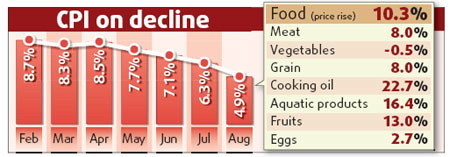
|
CHINA> National
 |
|
CPI drops to lowest in 14 months
By Wang Xu (China Daily)
Updated: 2008-09-11 07:45 Inflation eased to its lowest level in August since June last year, giving the government more policy leeway to prevent an economic slowdown. The consumer price index (CPI), the main gauge of inflation, rose 4.9 percent year-on-year, compared to 6.3 percent in July, the National Bureau of Statistics (NBS) said Wednesday. The CPI has been sliding since May, but still many economists were caught by surprise by last month's drop because they had forecast it to be above 5 percent. The month-on-month fall was only 0.1 percent. But last month's producer price index (PPI), a gauge of factory gate inflation, rose a record 10.1 percent year-on-year, after jumping 10 percent in July. Nevertheless, the low CPI figure gives the government "more policy room to sustain growth," Citigroup economist Ken Peng said.
He suggested the authorities consider further policy changes favoring growth, which could shift to full gear next month. Economic growth has been slowing since the second quarter of last year, when the government adopted monetary and credit measures to rein in inflation and prevent the economy from overheating further. Yet economists began warning of a recession since the beginning of this year, especially because the country's export sector, a key growth engine, started losing steam on weaker foreign demand. The government responded it would strive to maintain a stable economic growth this year, leading to speculation that it would soon ease the tightening measures. But any step to stimulate the economy, such as lower interest rates or faster loan growth, risks spurring demand and stoking inflation again. "Unless there's an abrupt slowdown, there's no need for a major change in the marco-control measures," said Lian Ping, an economist with the Bank of Communications. "The current 10 percent GDP growth is largely seen as acceptable." The CPI rise is likely to stabilize around 5 percent during the rest of the year, he said, because food prices may continue to drop. Inflation fell last month mainly because of a drop in food prices, which make up one-third of the inflation basket. Food prices slid 0.4 percent from July. A falling inflation rate gives the government a good chance to lift its price control on products such as fuel, water, and electricity further, Lehman Brothers economist Sun Mingchun said. In the past year, policymakers have managed to freeze the prices of public utilities, and fuel and power tariff. They introduced temporary price curbs on some other goods, too, to rein in inflation. Yet soaring labor and raw material costs, reflected in the rising PPI figure, have eaten into the profit of local enterprises because price control and fierce competition prevented them from passing the inflationary pressure on to consumers. Such price liberalization could make the CPI rise again in the next few months, Sun said. "But if implemented in a gradual and orderly way, inflation should remain below 6 percent year-on-year during the rest of the year."  |